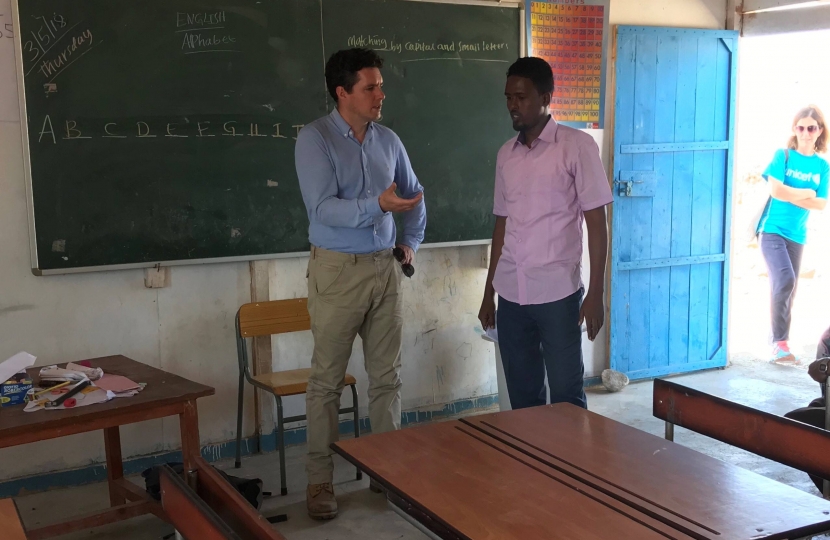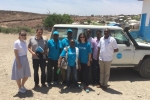
A 90 minute drive, on what can only loosely be described as a road, across the arid landscape towards Ethiopia, lies the Holl Holl Camp which is home to over 5,000 refugees from Somalia, Eritrea and Ethiopia.
The only interaction we should encounter across this stony landscape are with the camels and the nomadic people selling camel milk. However, we also come across wave after wave of, mostly, young men on the move. These are refugees fleeing part of Ethiopia. They have already walked 500km in the unforgiving heat. They are heading to Djibouti City and, they hope, on to the Gulf States in search of a better life. Most are not aware that there is a stretch of sea to navigate, or what will await in Yemen. There will be traffickers waiting to take advantage via prostitution or violence. Many will not make it. Some will not survive.
When we get to the refugee camp, we visit the school. Across Djibouti, 81% of children are in enrolled in school. At the camp’s school, the figure is an impressive 90%. The teacher and management committee explain that, for those aged 5 years old, they have two classes of 75 with a teacher in each. In comparison, a UK school should aim to have 30 pupils and will likely have a teaching assistant and a teacher. The parents are grateful for UNICEF and its partners for giving their children an education. We meet Government representatives, who will shortly take on the provision of refugee education. They have pledged to maintain the recognised teaching differences between the nationalities. This is heartening news and demonstrates that foreign aid will not always have to plug the gap.
Sadly, there is no classroom provision for pupils over the age of 13 years. The parents are desperate for a senior school. We go on to visit the sporting amenities available for young people. This being a rocky and arid landscape, there is only a small shelter which is absolutely crowded with children playing. We then visit the health centre and meet a group of camp elders. Asked what they need, they explain that they are very grateful for what has been provided but are concerned that a failure to provide secondary education, exercise and skills training for work will cause their teenagers to leave the camp and make the perilous journey. Another issue is healthcare. We meet a 3 year old with a heart condition. Sadly, the means to cure this condition are not available to this small child.
The visit to the refugee camp demonstrated to me that there is a huge amount which international aid is delivering on the ground to keep refugees safe and provide the basics. However, it also shows that more needs to be provided in the camps if they are to negate the lure of a dangerous journey in another continent where work may be found. Those who argue that we should take more refugees in the UK should ask themselves if we could make better use of the money we spend on settling refugees in the UK by offering more opportunities to refugees in camps close to their own border. It could save lives.



